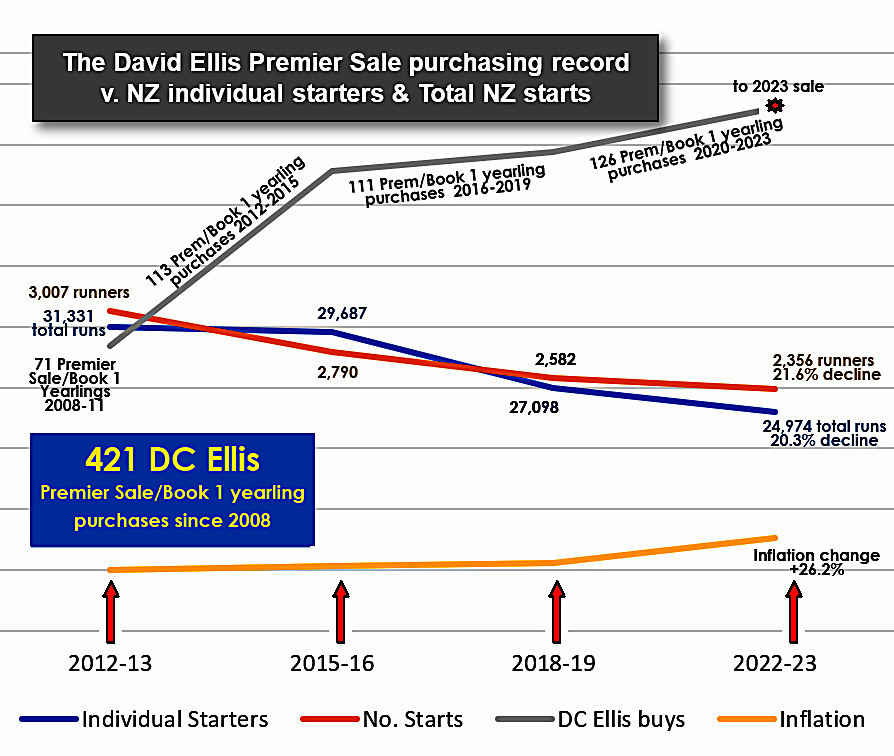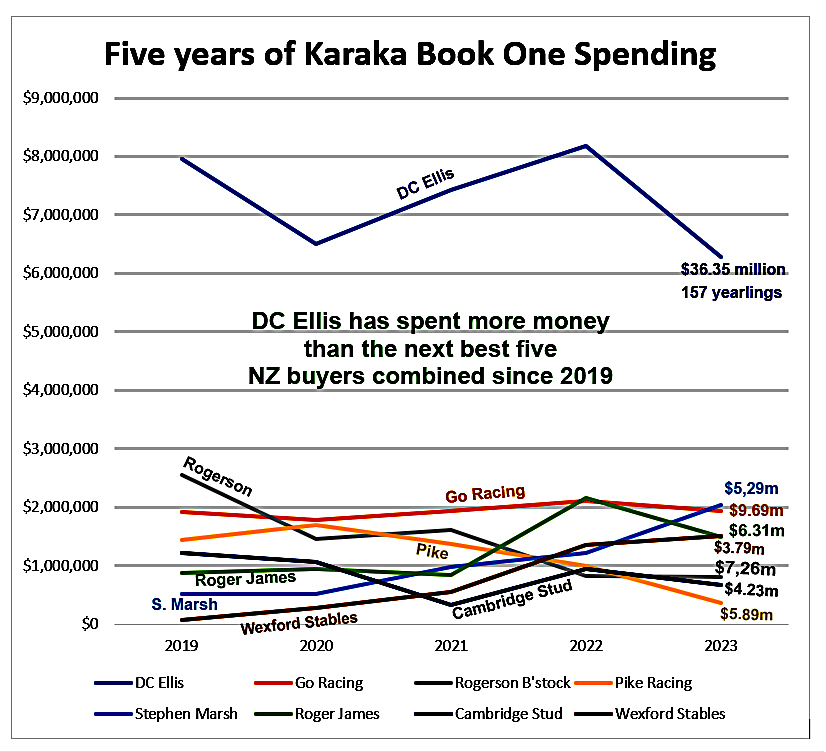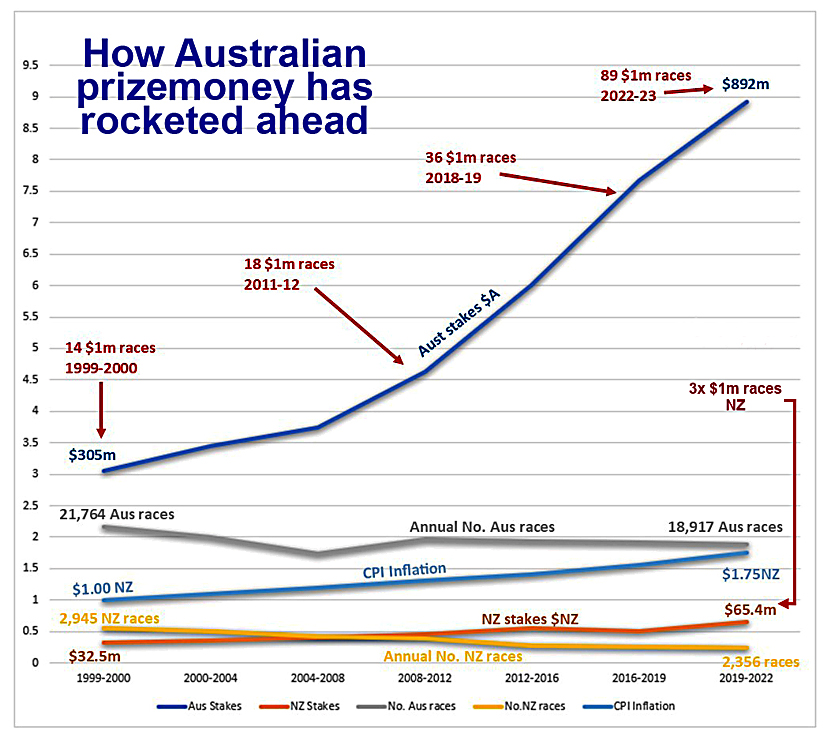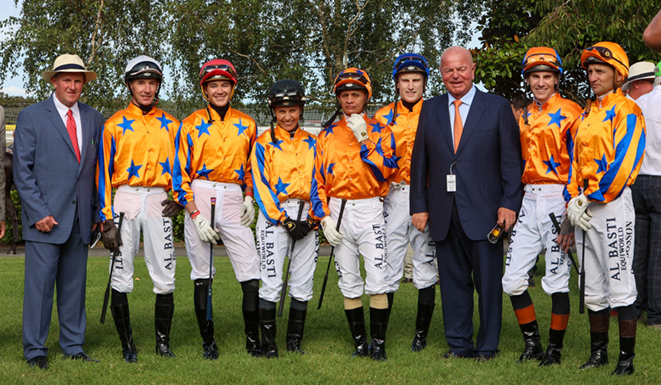by Brian de Lore
Published 30 April 2023
An emerging problem for New Zealand thoroughbred racing and breeding over the past five years or more – its reliance on a diminishing number of high-end stakeholders to keep the hoof beats thundering in an industry operating on shaky ground.
The crumbling foundation of racing due mostly to a lack of incentivising prizemoney has gone on for far longer than five years, but what we are all witnessing today resembles tall poppies with weakened root systems. The most recent evidence: $10 million less spent by New Zealanders on yearlings in Book One and Two at Karaka in 2023 than the previous year.
The 2023 sale at Karaka held up with $13 million more spent by internationals due to an incredible run of success by New Zealand-breds in Australia and Asia over the past couple of years – thanks to the astute breeders that keep the Kiwi flag flying high in Aussie, Hong Kong, and Singapore.
More evidence – our foal crop this coming season will decline to almost 1970 level at which time the Stud Book finalised the foal count at 2,388. The latest figures from Wellington say 2,510 foals hit the ground last spring in 2022, but we are also confronted by a continuing annual trend of fewer mares bred as each year passes.
The Stud Book says the 4,565 mares covered in 2021 contracted to 4,293 in 2022.
At the beginning of this millennium, the NZTR equivalent had conducted 2,945 races in the season ending 1999/2000. Last season that number had reduced by 20 percent to 2,356. The growing scarcity of the owner has gradually shrunk the number of horses in work and races run.

The year Sir Tristram went to stud in 1976, he became one of 28 first-season sires from a total of 359 registered horses in the NZ Stallion Register. In the 2022 publication, only 133 stallions appeared in the same but much thinner register of which only five made their debut.
Sir Tristram emerged from the pack of 28 to be Champion Sire, a numbers game traditionally said to give you one chance in 14 or 15 for a stallion to make the grade. In the three springs of 2020 to 2022, only 13 new stallions in total have debuted their stud careers in NZ – how does New Zealand in the future sustain its Australian group one record when the numerical challenge becomes so daunting?
The thoroughbred breeding business underpins the entire structure upon which yearling sales and then racing draws its race fields on which punters bet, from which percentages are devolved into stakes money. But static prizemoney and rising costs for the owner have disincentivised reinvestment, so the medium-sized or small trainer now goes to the sale without an order, or he/she stays home and watches the sale on Trackside.
This recidivous cycle of annual thoroughbred decline has gone on for almost 40 years since my day at Ra Ora Stud when the national foal crop of 1986 hit a high of 6,112 foals. From that point in history, we have witnessed a foal crop decline of 60 percent.

A few stalwarts have stayed strong in the arenas of racing, yearling sales, and breeding, and can rightly be described as thoroughbred industry linchpins, and heroes. They are people like David Ellis, Albert Bosma, Graham Rogerson, Stephen Marsh, Tony Pike, Roger James, Sir Peter Vela, Garry and Mark Chittick, Gerry Harvey, Mark Chitty, Nelson and Rodney Schick, John Thompson, Sam Williams, Brent and Cherry Taylor and in more recent times Brendon & Jo Lindsay, Lib Petanga and Luigi Muello.
Take those names out and the New Zealand thoroughbred industry ceases to exist, unlike years gone by when a broader and stronger bench of domestic buyers bought yearlings from three times as many individual vendors supplying the offerings from a much wider range of stud farms.
David Ellis has strengthened his position over the years as others have fallen off the pace or gone by the board, and as the leading buyer at Karaka for the 18th consecutive year in 2023, his racing successes have increased and the industry has become more and more reliant upon his continued involvement.
DC Ellis the most prolific yearling buyer in NZ history
Since 2008, David Ellis has purchased 421 yearlings for Te Akau from the Premier/Book 1 Sale and easily become the most prolific buyer in National Sales history – by miles. No one has bought more or had his sustained longevity, and in 2023 we have reached the point where we need to recognise the importance of the role he plays.
I called New Zealand Bloodstock CEO Andrew Seabrook who has witnessed DC Ellis buying over many years. He responded this way:
“It is plain for all to see the hugely significant impact that David Ellis has had on the National Yearling Sales at Karaka over a sustained period of time. There wouldn’t be another jurisdiction in the world where one person has had such an influence on a yearling sale’s turnover. Despite prize money being way off where it needs to be, David and Karyn’s ability to attract new people to the game, whilst at the same time taking on significant financial risk, is quite amazing.”
Te Akau has strengthened against a weakening trend (look at the graph) which is remarkable, and racing’s survival badly needs Ellis just as it needs others doing their best such as Go Racing’s Albert Bosma, Stephen Marsh, Roger James, etc. They are all to be admired for their work rate and persistence in seeking to annex the best races on the calendar.
All these people need each other to survive in the thoroughbred industry. Everyone who supports the industry in one way or another should be applauded, and those getting out can’t be blamed but it weakens the base for those remaining in their diminishing numbers.
Passion and hard work seem to be the common denominator amongst all those forging on regardless of the rocky thoroughbred landscape to which they look out at each morning.
The moral of the Jack Macky story
It reminds me of a story Joe Walls told me about the late, great breeder, Jack Macky who stood Champion Sire Le Filou at Pirongia Stud near Te Awamutu. Le Filou swept all before him from the mid-1950s and became champion sire in various categories on 10 occasions. But like all great sires, the end came one day, in Le Filou’s case the year of 1969.
The replacement sire for Le Filou arrived for his debut season in 1970 – his name, Headland II. One day in the mid to late 1970s, Joe Walls phoned Jack and inquired about Jack’s well-being. Jack said he was okay, but the day had started very poorly, but he had recovered and was okay now.
When Joe asked Jack about what caused his bad start to the day, Jack’s dry sense of humour came to the fore when he replied that he had woken well and early, looked out the window after drawing the curtains, and had seen that Headland II was still alive in his paddock– Headland II by then had established himself as possibly the worst sire ever to stand in New Zealand.
He ruined many of Jack’s well-bred Le Filou mares and the best horse Headland II ever sired after the best of opportunities, won five races over hurdles – he managed a handful of minor winners but never a stakes winner.
The moral of the story: The giddy heights of Le Filou can sink to the dark depths of Headland in one year if the bird falls off your shoulder – it fell dead off Jack’s, but Jack as a breeder once again invested in and relied upon one stallion.
The risk of spending $millions on yearlings without owners
In the yearling ring every year, David Ellis will purchase as many of what he considers the best yearlings in numbers as high as he dares to commit himself financially – he knows the chances of success diminish if you rely on a small pool of horses, but he also knows that buying horses without owners will sink you if can’t find the owners and pay the New Zealand Bloodstock invoice – this year $6.3 million for Book One alone.
He has become accustomed to the risk. In the past five Karaka Book Ones, DC Ellis has bought 157 yearlings for $36.35 million, more money spent than the next five best New Zealand buyers combined. When he returns home after a yearling sale, Karyn and David go into action to syndicate every horse – this year 31 from the two books at Karaka and a further nine from Magic Millions on the Gold Coast ($Aus2.7m).
They do more in three or four months after each sale to bring new owners into racing than NZTR has done in its entire existence. David bought his first horse in 1983 and did his first syndication in 1986 and has led the way in NZ in changing the face of ownership. Thousands of new owners cheering home the tangerine and blue exist through Te Akau’s escalating success.
The last four years of Horse of the Year titles came through DC Ellis purchases in Melody Belle (2) and Probabeel (2), and the 2023 winner is almost certainly going to be Imperatriz to give Te Akau five in a row. Then consider Te Akau has won seven consecutive Karaka Millions 2yos, going for number eight in 2024, has notched 358 black-type successes, and is closing in on 90 group one wins.

If we look at who’s driving what’s left of New Zealand racing; it’s not NZTR, it’s the syndicators and a few trainers who go out looking for owners – Te Akau, Go Racing, Stephen Marsh, Roger James, and Wexford – the five biggest NZ buyers at Karaka in 2023. The bloodstock agents also do a pretty good job operating both domestically and internationally.
Recent inflation has not treated racehorse owners well in the equation of training costs against potential returns, which is why syndicates purchase five and 10 percent shareholdings – syndicates within syndicates to give thousands of small shareholders a sense of ownership.
* * * *
On the prospect of increasing prizemoney, the signing of the TAB NZ-Entain partnership occurred five weeks ago but has yet to be ratified by Minister of Racing, Kieran McAnulty. Why?
Could a fundamental problem exist with the deal in the form of contingencies dependent upon geo-blocking Kiwi punters in a one-only betting shop monopoly?
I’m only guessing on that one, but for some reason, the Minister hasn’t yet signed it off. We know that the TAB wants geo-blocking, the Government wants it, and for a more lucrative profit margin, Entain will want it.
The punters certainly don’t want it. In our supposedly democratic, freedom-of-choice country which I refuse to call anything but New Zealand, geo-blocking is almost certain to conflict with the New Zealand Bill of Rights 1990.
(All statistics and graphs contained in this article compiled from BdL research)


if u want to come to sheryls rib hearing in may i can ask paul–
I’ll come, I need to know what the RIB is wasting our money on besides INCA, which by the way, I will request under the Official Information Act a full break-down of costs incurred.
We will all be interested in this breakdown Brian. Over inflated salaries for very little I fear
Hi Brian, unless you’re selling in Book 1 or the top end of Book 2 and the Ready to Run sales, commercial breeding is not viable. It would, for example, be illustrative to tally up the service fees (never mind all the other costs) to produce the foals and weanlings sold on Gavelhouse in the last twelve months and compare that with the total sales value. I suspect it would be sobering to to see just how much money is being lost breeding these horses. I absolutely agree that until better stakes underpin a more attractive ownership proposition we are going to continue to see reduced foal crops and a small number of trainers and syndicators dominating domestic racing. An unfortunate consequence of that dominance is the hollowing out of opportunities for the many other passionate industry participants (small-scale trainers, breeder-owners, owner-trainers etc.) who are an important part of the vibrancy and story of NZ racing and are now largely fighting for the crumbs left over after Te Akau et al have eaten most of the cake. Come on Minister McAnulty, get that agreement signed ASAP.
Highly illuminating facts and figures.
Telling but true.
The Hall of Fame is awaiting Ellis. Maybe that should happen sooner rather then later.
In theory, Ellis only pays one bid more than the underbidders . Possibly we should be thanking them. Or are we just thanking the vendors for strong reserves, or possibly other inducements. There is no doubt Ellis has a well oiled promotional machine that has attracted new people into horse racing, but it is unfortunate ,that the way syndication works in NZ compared to Australia ,where trainers themselves syndicate , assisted by payments of winning stakes directly to the syndicate shareholder by the racing authorities , so making syndicate management so much easier, that this is not done in NZ . If NZ Racing and the trainers association set out to help trainers syndicate with education on promotion and with direct payment of receipts to share holders we could have the trainers working more actively as promoters of racing ownership and a wider buying bench at the sales
Ironically, the decline in ownership means a decreasing fan club, that each horse has and consequently , a decrease in the supporting betting that they bring . This then lowers the turnover and hence eventually the racing stakes . Hard to break this vicious circle without a concerted effort
I know I should be able to collate this figure, but based on what DCE has paid at the sales over the past 5 years, what have the horses purchased won over the same period ?
I appreciate the numbers are not comparing apples with apples, but as a guide ….
Dickey.
It’s the same for everyone buying yearlings; crap returns in NZ for the investment because of prizemoney. If the powers had only listened to John Messara five years ago, we’d be racing for double or more. Seven successive Magic Millions 2yos isn’t bad; how much money have your horses won?
Good article, Brian. Te Akau is a hard act to follow, much less compete against. They have beautifully-bred horses, their trainers [ esp. the last two ] are outstanding, and the regime leaves no stone unturned to achieve success.
Stakemoney is, I feel, irrelevant to their operation [ they’d hae a base over the ditch if it wasn’t ] most shareholders join the tangerine team for the experience, the excitement, of sharing in the ownership of these lovely animals – and as well, their communication is outstanding.
However, as far as the Entain deal goes, I have to wonder if McAnulty is ham-strung by the requirements of the Act ? is it not a legal requirement that the codes, for starters, are informed and give their permission for any change in TAB function?
Sharrock appears not to know any detail at all. Now, I think he is a smart bloke [ which doesn’t mean I trust him, or agree with the course he is steering his TB ship on ] so, if he doesn’t know, wtf is going on?
You raise a very good point, Pam. It is not a legal requirement that the codes give their permission, but the legislation did, however, provide the opportunity for the three codes to get together and draw up a commercial agreement to present to the TAB which is only supposed to collect the money on behalf of the codes – that came from the Messara Review which devolved decision-making to the codes. But the codes, now known as dumb, dumber and dumber still, never got together to draw up an agreement and utilise the power the legislation provided them. That commercial agreement would have covered such things as the codes having a say in the ‘partnering’ or ‘outsourcing’ of the TAB. They missed the boat, and so the tail is still wagging the dog. So don’t give Sharrock, George and company too much credit for being smart. I would argue the other.
…and another couple of thoughts. How does a company which operates under normal commercial constraints – pays taxes/duties/levies. etc – align itself with a Govt sanctioned and subsidised monopoly ?
And what about the Cl gaming licence for pokies? does that get transferred too?
Fair enough!
I would concur wholeheartedly wrt George; as for the other codes’ representatives, can’t really say but their response to racings ills have so far been underwhelming to nonexistent.
Brian,
seeing as you ask,over almost 40 years of horse ownnership in both codes I have enjoyed tremendous enjoyment and fun during that time with horses I have had shares in. Nearing 50 winners and about one 1million in total stake money. Of course I have not banked that amount as the spread of shareholding has been as low as 1% up to 50%. in a horse.
It should be noted 40% of the stake money was won by a standard bred racing in Australia where it won 7 races.
l have not worked out and do not wish to ascertain if I am ahead in money out money in over the four decades..
Happy racing.
Brian one point about geo blocking, is that while it may restrict NZ punters from betting elsewhere, it could further prevent overseas punters accessing our tab. I’m not sure if the NZ market long term could match the returns of NZ selling their product world wide. Short term, it may stop the rot, but it would leave the management comfortable in their lounge chairs, when they should be looking to become exporters and generally improving our market reach . Any partnership the NZ Tab has, must ensure NZ somehow eventually gets benefit from access to more of the world gambling market.